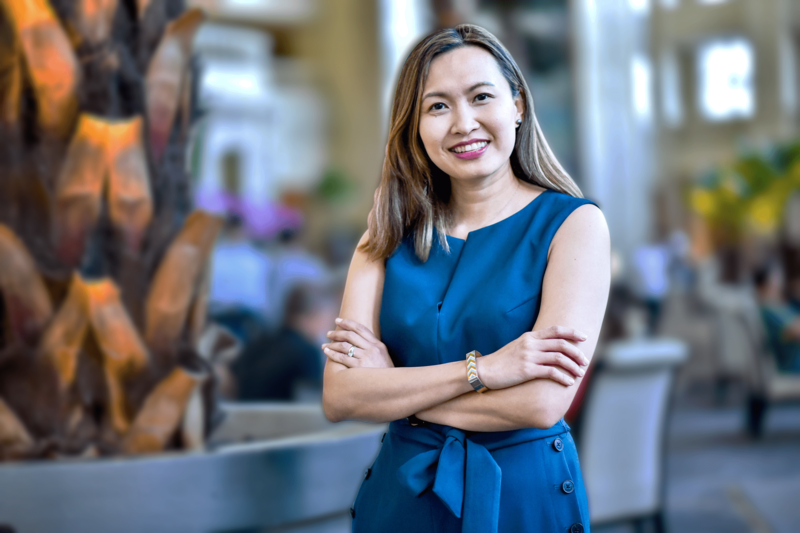ALUMNI STORIES: ‘I AM ON A MISSION TO MAKE BUSINESSES A FORCE FOR GOOD’

ALUMNI STORIES: ‘I AM ON A MISSION TO MAKE BUSINESSES A FORCE FOR GOOD’
Janice Lao (St Catherine’s, 2004) spoke to us about her inspiration to become an environmental scientist, how she co-authored (with her daughter) her children’s climate change book, being named in Forbes as one of the world’s most influential sustainability leaders and her top tips for being a sustainability hero
Published: 29 March 2021
Author: Zoe Burns
Share this article
What initially drew you to study at Oxford?
As a woman, I was inspired by a lot of women who studied in Oxford - from Margaret Thatcher to Benazir Bhutto. I also was so enamoured by the long history and tradition at Oxford and I wanted to be part of that. I was also so up to the challenge of studying with some of the world's brightest people. I really wondered what that was going to be like!
Tell us about your most rewarding experience of studying at Oxford?
The most rewarding would be the challenge of writing essays on near weekly basis and waiting for feedback from my world-leading research professors who asked for nothing else but excellence in me. While it was tough to get used to initially, I learned a lot about preparation, organising my thoughts, being clear and being comfortable in being challenged in my arguments. I am a better professional today because of this experience.
How do you think your time at Oxford changed you?
It was life-changing in so many ways. During class we were encouraged to get into healthy and constructive debate. I became at ease with that, and Oxford taught me and gave me that superpower. I am able to listen and hone in to arguments and also find common ground even with people who I may not seem to have any commonality with, and do it in a kind and compassionate way.
What is the best piece of advice that anyone at Oxford gave you, and how is it still relevant to you today?
That feedback and any reaction from someone is a gift. If someone is being rude to you, they have likely run out of relevant arguments and is more telling about them than it is about you. Every feedback is an invitation to improve on your life, and you can accept that invitation or choose not to. That is such powerful advice to a then 20+ year old, and that is still true today.
What motivated you to become an environmental scientist?
As a young child I witnessed my mother, as she was an underground political activist back then, and she managed to help topple a dictatorship. I saw what perseverance, care for others and standing for your beliefs can do. I saw her sacrifice so much for me and my brother and I knew that I wanted to live as passionately and as purposeful as she was. When I was 18 I was introduced to environmental science while reading Readers Digest articles (remember those?) and was so taken by what we were doing to nature that was counterintuitive to enable humans to thrive. I felt called to do this and now it has become my life's mission. I am here not to ‘save nature’ but to save nature for us. There is no planet B.
Tell us about your inspiring journey from studying for your master's at Oxford to becoming the first Asian and the youngest person to win the Edie Sustainability Leader of the Year Award.
That was 13-15 years in the making. Oxford really had to do a lot. As a woman of colour, I face many barriers, but having the Oxford degree helps open doors. After leaving Oxford I worked in Washington DC, London and Hong Kong, working on pioneering projects such as sustainable financing, ESG investing, developing mathematical and economic models for carbon emission reduction, refugee employment programs, sustainable seafood tool, etc. I think the combination of my tenacity, the soft skills I learned in Oxford (remember the superpower earlier) and my degree really propelled me and gave me the credibility to lead these projects. This led to my receiving the award, and I continue to be humbled by the recognition.
What are you working on at the moment?
I am working on my second book, this time with my son Isaac, called Penguins Can Fly Right, which is about looking at your perceived weaknesses in a different light. I realised later on as an adult that a lot of my grief came from believing others' narratives and stereotypes about me. And if I had only seen things differently I would have been much kinder to myself.
Currently, I am based in El Paso, Texas working for an American consumer goods company leading their global ESG efforts.
Which of your achievements are you most proud of?
I am very proud of how much I have overcome in my life. The awards and recognition are great, but it's the iceberg beneath the surface that I'm more proud of, each one of those I've overcome. I hope my children will take inspiration from that and see that truly, what you set your heart and mind to, you will achieve. It will not be easy, but it will be worth it.
Throughout your career you have developed and worked on pioneering sustainability initiatives that have become global industry standards from carbon trading, biodiversity, responsible seafood sourcing to single-use plastics and many more. What is next for you? Are there any sustainability initiatives that you still desperately want to implement or an industry you dream of transforming?
I am on a mission to make businesses a force for good. I believe the role of business is not in making the most money, but in solving some of the world's biggest problems and earning a decent living from it.
How has the coronavirus pandemic affected business sustainability goals?
It's helped demonstrate that an economy can only succeed if society and the environment thrives. It has really brought that to fore. An economy is only as strong as its weakest link.
In your book Sparky and Benny’s Big Home Mystery, two kid whales, Sparky and Benny, find out they are about to lose their home. They ask the big question, ‘why are the adults not doing anything about it?’ Through your work, are you seeing changing attitudes towards climate change and believe that adults really are now starting to do something about it?
Yes I am finally seeing a shift, one I never expected. Sadly, part of it is because we are experiencing severe impacts now and I tell people, this is not the worst yet. So I hope that we can see more action before it becomes too late for all of us.
You were featured in the book Everyday Superheroes: Women in STEM Careers. Who are YOUR Everyday Superheroes and why?
My mom is my superhero. She was born at a time when women were only beginning to work and have careers. She set me up in life to succeed so that no matter what life threw at me she was confident I was going to overcome it. I also don't know if I would have done what she did as an underground political activist. During that time she could have lost her life; I would have understood if she turned a blind eye to it. I can only wish I could be half the brave woman she is.
What are your top three tips for how we can all become sustainability superheroes?
A lot of sustainability solutions must come from a full acceptance of who we are. If we can find joy and fulfilment within ourselves instead of consuming, we would have a different type of economy- more geared to circular economy and slow 'consumerism'.
So my top three tips are not the usual tips - they would be:
1. be you, don't try to be someone else; 2. find joy within and not from material things; 3. be an influencer to others by living your life with purpose for the greater community.
What’s your guilty pleasure that’s helped you through the COVID-19 pandemic?
I'm obsessed with interior design shows on YouTube. Spending more time at home has got me thinking about how I can make my home even more liveable!
Janice will be joining us for Meeting Minds Global 2021 on Monday 12 April with her talk 'Communicating the climate crisis'
Register for Meeting Minds Global 2021 to hear Janice Lao's talk 'Communicating the climate crisis', on Monday 12 April.















